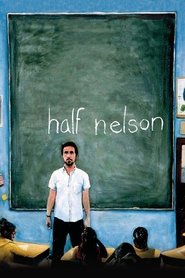Huh, I wasn't expecting this from the poster at all. Indeed, its low-key nature very much works in its favour, sneaking through the emotional radar. I get a lot of "second Bush term" weariness throughout, although this movie could potentially have been made for at almost any time since the mid-1990s.
Sherry Ortner is very good on this film:
Half Nelson is not a film in which history is erased, but a film about, among other things, the erasure of history.At certain moments in the film there are oddly staged scenes. The film leaves the realist mode, and we suddenly see a student against a blank background reciting a set piece about some political event of the sixties or seventies. The student faces the camera and speaks directly into it and to the audience, with news footage of the event playing in the background. The students are blank-faced as they recite, and clearly have little understanding of what they are talking about. At the end of each of these scenes, the film cuts back to the realist mode and resumes the narrative.
I will interpret this striking pattern through the lens of [a Fredric] Jameson article on postmodernism. […] In that article, Jameson has an extended discussion of what he calls “the weakening of historicity,” or sometimes “the waning of historicity,” in contemporary (“postmodern”) society. This is one of several ways, including also the “waning of affect” and the loss of “depth models” (id/ego, base/superstructure), according to Jameson, through which the capacity for radical political thinking and action is being undermined in this new epoch. […] The film appears as a virtual dramatization of Jameson’s essay. That is, this is not a film in which politics are erased, but rather a film about the erasure, or anyway the loss, of historical and political consciousness.
The impression made (at least for me) by the mises-en-scènes of these vignettes was of a newscast, with the students as anchorpersons, facing the camera, speaking in that kind of pleasant but completely impersonal way about events that [have] nothing to do with them. [But] why create these strange “newsrooms,” breaking up the narrative continuity of the film? I propose we are seeing here another aspect of Jameson’s discussion. These decontextualized scenes seem to be saying that history has not only become faded and distant, but that events that once had meaning as part of an overarching narrative have themselves been decontextualized, broken out of linear time and broken up into pieces. The scenes can thus be read as visual statements of Jameson’s famous point, drawing on Guy Debord, that the past has become fragmented into “a vast collection of images, a multitudinous photographic simulacrum.” He goes on: “Debord’s powerful slogan is now even more apt for the ‘prehistory’ of a society bereft of all historicity, whose own putative past is little more than a set of dusty spectacles.
And finally one could ask what all this has to do with the fact that the well-meaning radical history teacher is a drug addict, losing control of his life? […] If one continues within the Jamesonian framework, one would have to look at Jameson’s discussions of postmodern subjectivity, not unrelated to, but distinct from, his discussions of history and historicity. In this context, Dan Dunne’s progressively deteriorating drug addiction appears as an almost literal portrayal of a passage from a life of (“modernist”) thought and purpose (the radical politics) into new forms of postmodern affect. Jameson describes these new forms of affect in several different ways, but at one point he uses the phrase “euphoria and selfannihilation”, a combination captured almost too literally by the drug addiction. Along these lines, we may also consider the students’ blank and expressionless faces as they read the “news.” Here, too, there is an almost perfect fit with another of Jameson’s claims about postmodern subjectivity: the students in these contexts can be read as enactments or embodiments of what Jameson calls “the waning of affect,” defined as “a new kind of flatness and depthlessness [which is] perhaps the supreme formal feature of all the postmodernisms”.
— Sherry B. Ortner, Not a History Lesson: The Erasure of Politics in American Cinema (2013)
Synopsis: Despite his dedication to the junior-high students who fill his classroom, idealistic teacher Dan Dunne leads a secret life of addiction that the majority of his students will never know. But things change when a troubled student Drey makes a startling discovery of his secret life, causing a tenuous bond between the two that could either end disastrously or provide a catalyst of hope.

